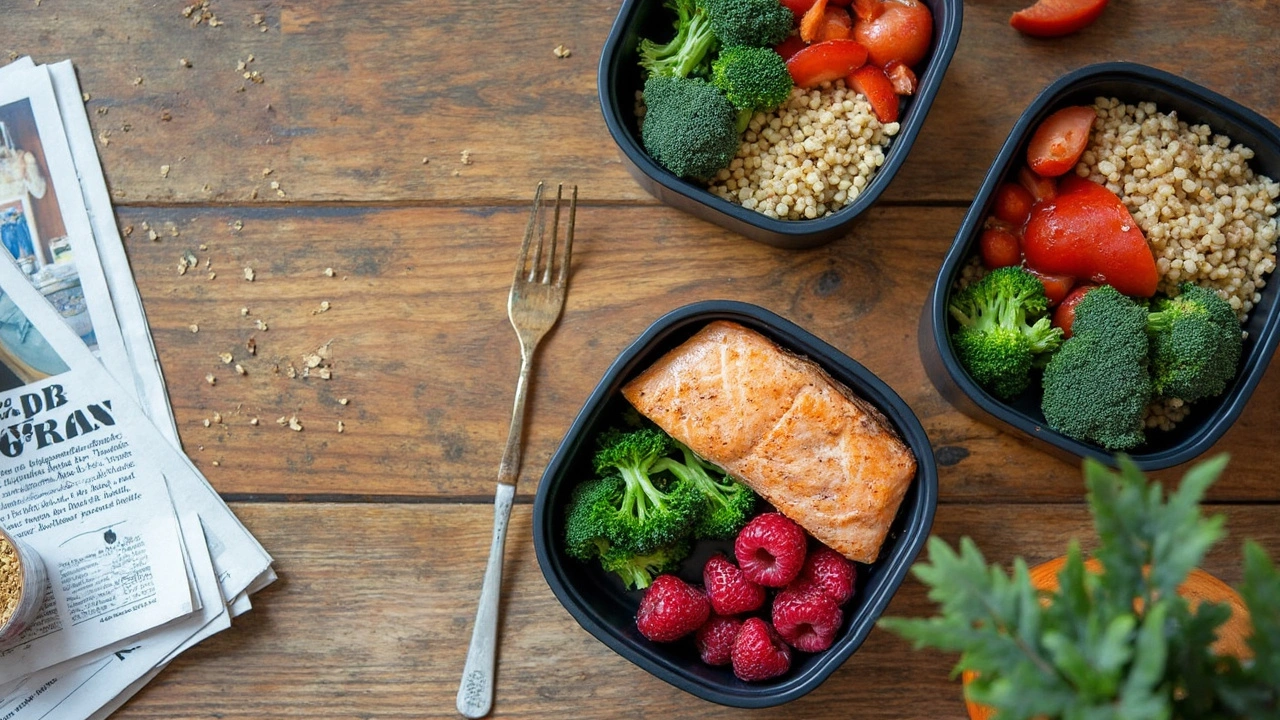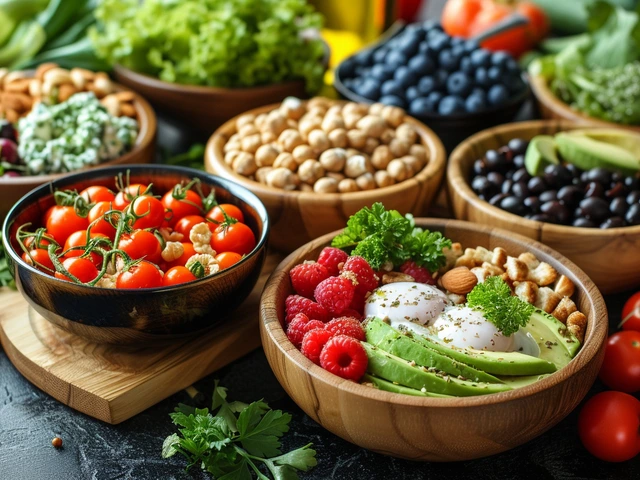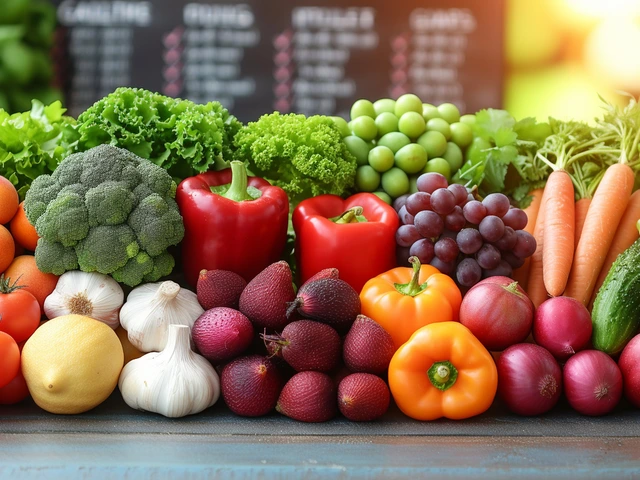If you're trying to tackle a busy schedule, hit your goals at work, or power through a workout, what you eat makes a bigger difference than most people realize. Skipping breakfast or loading up on sugar might get you started, but you'll probably run out of steam fast. Energy drinks? They come with a crash that no one's got time for. Real fuel for your brain and body comes from your everyday meals and snacks, not quick fixes.
Peak performance isn't just for athletes or CEOs—it's about your best energy, focus, and mood all day long. The good news? You don't need to count every calorie or survive on bland salads. The biggest wins come from small, smart changes: think swapping out white bread for whole grain, or adding a handful of nuts to your snack rotation. Tiny tweaks like this build up, and suddenly you don't just get through the day—you own it.
- Why Diet Matters More Than You Think
- Foods That Boost Mind and Body
- Avoiding The Energy Traps
- Everyday Habits for Lasting Results
Why Diet Matters More Than You Think
It’s wild how much a healthy diet can power up your life. Think about the last time you felt sluggish after lunch, or went blank in a meeting straight after eating fast food. That’s not just in your head—food affects everything from your mood to your focus, and even your immune system.
The basics of a healthy diet aren’t actually complicated. Fresh produce, lean proteins, healthy fats, and complex carbs help keep you sharp and steady. There’s a solid reason most top-performing athletes, entrepreneurs, and even astronauts have nutritionists on speed-dial—their brains and bodies depend on getting those right nutrients.
One cool thing the CDC found: people who eat more fruits and veggies tend to have lower rates of heart disease, some cancers, and even less stress. That’s no accident. Real food helps your body handle pressure better, fight off germs, and bounce back after tough days.
And here’s something not everyone talks about: blood sugar dips and spikes aren’t just for people with diabetes. Huge swings can mess with anyone’s energy and mood. Balanced meals slow down how sugar gets released, so you don’t crash midday.
- Protein helps rebuild muscles and keeps you full longer.
- Healthy fats (like those from avocados or nuts) are brain boosters.
- Whole grains give you steady, reliable energy.
- Real, colorful veggies feed you vitamins your body actually needs, not just empty calories.
| Food Choice | Impact on Performance |
|---|---|
| Whole grains | Long-lasting energy, steadier focus |
| Sugary snacks | Quick bursts, but major crash later |
| Leafy greens | Better digestion, more micronutrients |
| Fast food | Sluggish mood and slow recovery |
If you want the “secret weapon” for getting through those packed days or tough workouts, look at what’s on your plate. The evidence is clear: a healthy diet is the real game changer for peak performance.
Foods That Boost Mind and Body
Let’s get real: if you want true peak performance, you’ve got to eat foods that do more than just fill you up. Some foods have this superpower to keep both your mind sharp and your body going strong. The trick is knowing which ones to grab.
For steady all-day energy, complex carbs like oats, brown rice, and sweet potatoes are winners. They break down slow, so you don’t get a mid-morning slump. My husband Leonard switches up his work snacks between whole grain crackers and apple slices with peanut butter—and neither of us gets hangry anymore.
When it comes to boosting your focus, nothing beats foods rich in omega-3s, like salmon, walnuts, and flax seeds. Omega-3s are actually proven to support brain health. In fact, studies out of Harvard have linked diets high in omega-3s with better memory, less brain fog, and even a lower risk of depression.
If you’re looking for a quick recovery and better mood, toss in foods loaded with antioxidants—think blueberries, spinach, kale, and even dark chocolate (yep, it counts if it’s 70% cocoa or higher!). They help your cells fight off stress and fatigue, so you can bounce back faster from hard days or killer workouts.
- Nuts and seeds: Packed with healthy fats, protein, and magnesium (great for mood and muscles).
- Eggs: Loaded with choline, which the brain uses for memory and concentration.
- Greek yogurt: High in protein, keeps hunger in check, and the probiotics are good for your gut.
- Berries: Natural sugar plus fiber, which means sweet snacks without the sugar crash.
And don’t forget to hydrate—sometimes fatigue is just your brain asking for water. Even losing 1–2% of your body’s water can affect focus and coordination.
| Food | Main Benefit | Nutrient Highlight |
|---|---|---|
| Salmon | Brain power, heart health | Omega-3 |
| Oats | Steady energy | Complex carbs, fiber |
| Blueberries | Antioxidants, memory | Anthocyanins |
| Greek Yogurt | Muscle support, gut health | Protein, probiotics |
| Spinach | Recovery, immune support | Iron, Vitamin C |
Building your daily meals around these healthy diet staples gives you a solid shot at better brainpower, a happier mood, and real staying power—without the crash.

Avoiding The Energy Traps
The biggest mistake people make when chasing peak performance? Falling into what I call the “energy trap.” That’s when you grab something that feels like it’ll perk you up—think soda, candy bars, a triple-shot latte—only to crash hard a couple hours later. These foods mess with your blood sugar, making you feel tired, cranky, and unfocused. Not exactly what anyone’s going for.
Here’s what happens: You eat or drink something packed with sugar or refined carbs. Your blood sugar shoots up, so you feel a quick buzz. Then your body releases insulin to clear out the sugar, and suddenly, your blood sugar crashes—even lower than where you started. That’s when you get the afternoon slump or brain fog.
To steer clear of these energy traps, focus on foods that digest more slowly. Pairing carbs with protein or healthy fats keeps sugar levels steady and helps you feel satisfied longer. For example, swap a bagel and cream cheese for whole grain toast with nut butter. Try a yogurt with berries and seeds instead of just sugary cereal. Even snacks like hummus and carrots work better than cookies out of the vending machine.
- Start the day with a balanced breakfast: throw some eggs and spinach on whole grain toast, or blend Greek yogurt, oats, and berries if you prefer sweet.
- Stick to whole, unprocessed foods—think nuts, seeds, fruit, veggies, lean proteins, and whole grains.
- Watch out for sneaky sugar in “healthy” bars and packaged snacks. If sugar or syrup is one of the first ingredients, it’s usually a fast ticket to an energy crash.
- Stay hydrated! Sometimes you feel tired because you’re actually just dehydrated.
It’s not just about what to avoid, but what to add. If you need a quick pick-me-up, reach for a handful of nuts, a piece of fruit, or even a plain rice cake with peanut butter. Meals and snacks with fiber, protein, and healthy fats give your body what it needs to run strong—all day, every day.
| Common Trap Food | Smarter Swap |
|---|---|
| Candy Bar | Banana with almond butter |
| Energy Drink | Cold water + lemon slice |
| Pastries | Whole grain crackers + cheese |
| Soda | Sparkling water or unsweetened tea |
Bottom line: steady energy comes from what you put in your body throughout the day. Ditch the quick fixes and you’ll notice you can really get more done—with way less drama from those annoying afternoon crashes.
Everyday Habits for Lasting Results
Nailing a healthy diet isn’t about one-off “healthy” days—it’s all about building easy routines that stick. The basics are simple, but the magic happens when you actually do them most days, not just when you feel motivated or guilty after a weekend binge.
Start with breakfast. People who eat a balanced breakfast tend to have better focus and fewer cravings through the day. Something as basic as Greek yogurt with berries or whole grain toast and eggs can make a real difference. Studies show that folks who include protein at breakfast feel fuller for longer and snack less during the day.
- Try the plate method: Fill half your plate with veggies or fruit. The rest? Divvy it up between lean proteins (like chicken, beans, or eggs) and whole grains.
- Stock healthy snacks: If you don’t have junk food at home, it’s much harder to eat it. Keep cut-up veggies, nuts, or fruit where you can see them.
- Hydrate before you caffeinate. Most people start their day a little dehydrated, which saps energy. Drink a glass of water first thing, then grab your coffee or tea.
Don’t forget about meal planning. Sunday night doesn’t have to be a meal-prep marathon, but thinking ahead helps you skip the drive-thru on crazy days. I like to prep a batch of grilled chicken or roasted veggies—just pull them from the fridge and toss in salads or wraps when life gets busy.
Consistency wins every single time. It takes a few weeks to turn something into a habit, but you don’t need to overhaul everything at once. Pick two easy changes—like swapping soda for sparkling water and eating an extra serving of veggies a day. Once those feel second-nature, add another.
| Instead of... | Try... |
|---|---|
| White bread | Whole grain bread |
| Chips | Roasted chickpeas or nuts |
| Soda | Sparkling water with fruit |
| Candy bar | Fruit and nut mix |
| Creamy salad dressing | Olive oil and lemon juice |
Set realistic goals and track small wins. There’s no need to eat perfectly; it’s more about hitting your nutrition tips and healthy choices most of the time. Stick with it, and your body and brain will thank you—whether you’re lifting weights, chasing kids, or grinding through a long workday.





